- Home
- Muriel Spark
The Ballad of Peckham Rye Page 8
The Ballad of Peckham Rye Read online
Page 8
‘Where does this get us?’
‘I can’t say,’ Dougal said. ‘It is only a preliminary analysis.’
‘Please embody all this in a report for us, Mr Dougal.’ Dougal opened his brief-case and took out two sheets of paper. ‘I have elaborated on the question here. I have included case histories.’
Mr Willis smiled with one side of his mouth and said, ‘Which of these four moral codes would you say was most attractive, Mr Dougal?’
‘Attractive?’ Dougal said with a trace of disapproval.
‘Attractive to us. Useful, I mean, useful.’
Dougal pondered seriously until Mr Willis’s little smile was forced, for dignity’s sake, to fade. Then, ‘I could not decide until I had further studied the question.’
‘Well expect another report next week?’
‘No, I’ll need a month,’ Dougal stated. ‘A month to work on my own. I can’t come in here again for a month if you wish me to continue research on this line of industrial psychology.’
‘You must see round the factory,’ said Mr Willis. ‘Peck-ham is a big place. We’re concerned with our own works first of all.’
‘I’ve arranged to be shown round this afternoon,’ Dougal said. ‘And at the end of a month I hope to spend some time with the workers in the recreation hails and canteens.’
Mr Willis looked silently at Dougal who then permitted himself a slight display of enthusiasm. He leaned forward.
‘Have you observed, Mr Willis, the frequency with which your employees use the word “immoral”? Have you noticed how equally often they use the word “ignorant”? These words are significant,’ Dougal said, ‘psychologically and sociologically.’
Mr Willis smiled, as far as he was able, into Dougal’s face. ‘Take a month and see what you can do,’ he said. ‘But bring us a good plan of action at the end of it. Drover, my partner, is anxious about absenteeism. We want some moral line that will be both commendable by us and acceptable to our staff. You’ve got some sound ideas, I can see that. And method. I like method.’
Dougal nodded and took his long serious face out of the room.
Miss Frierne said, ‘That boy Leslie Crewe has been here. He was looking for you. Wants to go your errands and make a bob like a good kid. Perhaps his mother’s a bit short,’
‘Anyone with him?’
‘No. He came to the back door this time.’
‘Oh,’ Dougal said, ‘did you get rid of him quickly.’
‘Well, he wouldn’t go for a long time. He kept saying when would Mr Douglas be home, and could he do anything for you. He was very polite, I will say that. Then he asked the time and then he said his Dad used to live up this road in number eight. So I took him in the kitchen. I thought, well, he’s only a boy, and gave him a doughnut. He said his sister was looking forward to marrying Humphrey in September. He said she saves all her wages and the father in America dresses her. He said —‘
‘He must have kept you talking a long time,’ Dougal said.
‘Oh, I didn’t mind. It was a nice break in the afternoon. A nice lad, he is. He goes out Sundays with the Rover Scouts. I’d just that minute come in and I was feeling a bit upset because of something that happened in the street, so —‘
‘Did he ask if he could go up and wait in my room?’
‘No, not this time. I wouldn’t have let him in your room, especially after you said nobody was to be let in there. Don’t you worry about your room. Nobody wants to go into your room, I’m sure.’
Dougal said, ‘You are too innocent for this wicked world.’
‘Innocent I always was,’ Miss Frierne said, ‘and that was why I was so taken aback that day by the Gordon Highlander up on One Tree Hill. Have a cup of tea.’
‘Thanks,’ Dougal said. ‘I’ll just pop upstairs a minute first.’
His room had, of course, been disturbed. He unlocked a drawer in his dressing-table and found that two notebooks were missing. His portable typewriter had been opened and clumsily shut. Ten five-pound notes were, however, untouched in another drawer by the person who had climbed to his room while Leslie had engaged Miss Frierne in talk.
He came down to the kitchen where Miss Frierne sighed into her tea.
‘Next time that Leslie comes round to the back door have a look, will you, to see who he’s left at the front door. His father’s worried about his companions after school hours, I happen to know.’
‘He only wanted to know if you had any errands to run. I daresay to help his mother, like a good kid. I told him I thought you’re short of bacon for your breakfast. He’ll be back. There’s no harm in that boy, I know it by instinct, and instinct always tells. Like what happened to me in the street today.’ She sipped her tea, and was silent.
Dougal sipped his. ‘Go on,’ he said, ‘you’re dying to tell me what happened.’
‘As true as God is my judge,’ she said, ‘I saw my brother up at Camberwell Green that left home in nineteen-nineteen. We never heard a word from him all those years. He was coming out of Lyons.’
‘Didn’t you go and speak to him?’
‘No,’ she said, ‘I didn’t. He was very shabby, he looked awful. Something stopped me. It was an instinct. I couldn’t do it. He saw me, too.’
She took a handkerchief out of her sleeve and patted beneath her glasses.
‘You should have gone up to him,’ Dougal said. ‘You should have said, “Are you…” — what was his name?’
‘Harold,’ she said.
‘You should have said, “Are you Harold?”, that’s what you ought to have done. Instead of which you didn’t. You came back here and gave a doughnut to that rotten little Leslie.’
‘Don’t you point your finger at me, Dougal. Nobody does that in my house. You can find other accommodation if you like, any time you like and when you like.’
Dougal got up and shuffled round the kitchen with a slouch and an old ill look. ‘Is that what your old brother looked like?’ he said.
She laughed in high-pitched ripples.
Dougal thrust his hands into his pockets and looked miserably at his toes.
She started to cry all over her spectacles.
‘Perhaps it wasn’t your brother at all,’ Dougal said.
‘That’s what I’m wondering, son.
‘Just feel my head,’ Dougal said, ‘these two small bumps here.’
‘There are four types of morality in Peckham,’ Dougal said to Mr Druce. ‘The first category is —‘
‘Dougal,’ he said, ‘are you doing anything tonight?’
‘Well, I usually prepare my notes. You realize, don’t you, that Oliver Goldsmith taught in a school in Peck-ham? He used to commit absenteeism and spent a lot of his time in a coffee-house at the Temple instead of in Peckham. I wonder why?’
‘I need your advice,’ Mr Druce said. ‘There’s a place in Soho —‘
‘I don’t like crossing the river,’ Dougal said, ‘not without my broomstick.’
Mr Druce made double chins and looked lovingly at Dougal.
‘There’s a place in Soho —‘
‘I could spare a couple of hours,’ Dougal said. ‘I could see you up at Dulwich at the Dragon at nine.’
‘Well, I was thinking of making an evening of it, Dougal; some dinner at this place in Soho —‘
‘Nine at the Dragon,’ Dougal said.
‘Mrs Druce knows a lot of people in Dulwich.’
‘All the better,’ Dougal said.
Dougal arrived at the Dragon at nine sharp. He drank gin and peppermint while he waited. At half past nine two girls from Drover Willis’s came in. Dougal joined them. Mr Druce did not come. At ten o’clock they went on a bus to the Rosemary Branch in Southampton Way. Here, Dougal expounded the idea that everyone should take every second Monday morning off their work. When they came out of the pub, at eleven, Nelly Mahone crossed the street towards them.
‘Praise be to the Lord,’ she cried, ‘whose providence in all things never fails.’
‘Hi, Nelly,’ said one of the girls as she passed.
Nelly raised up her voice and in the same tone proclaimed, ‘Praise be to God who by sin is offended, Trevor Lomas, Collie Gould up the Elephant with young Leslie, and by penance appeased, the exaltation of the humble and the strength of the righteous.’
‘Ah, Nelly,’ Dougal said.
Chapter 7
‘YES, Cheese?’ Dougal said.
‘Look, Doug. I think I can’t have this story about the Dragon at Dulwich, it’s indecent. Besides, it isn’t true. And I never went to Soho at that age. I never went out with any managing director —‘
‘It will help to sell the book,’ Dougal said. He breathed moistly on the oak panel of Miss Frierne’s hall, and with his free hand drew a face on the misty surface where he had breathed.
‘And Doug dear,’ said the voice from across the river, ‘how did you know I started life in a shoe factory? I mean to say, I didn’t tell you that. How did you know?’
‘I didn’t know, Cheese,’ Dougal said.
‘You must have known. You’ve got all the details right, except that it wasn’t in Peckham, it was Streatham. It all came back to me as I read it. It’s uncanny. You’ve been checking up on me, haven’t you, Doug?’
‘Aye,’ Dougal said. He breathed on the panel, wrote in a word, then rubbed it off.
‘Doug, you mustn’t do that. It makes me creepy to think that people can find out all about you,’ Miss Cheeseman said. ‘I mean, I don’t want to put in about the shoe factory and all that. Besides, the period. It dates me.
‘It only makes you sixty-eight, Cheese.’
‘Well, Doug, there must be a way of making me not even that. I want you to come over, Doug. I’ve been feeling off colour.’
‘I’ve got a fatal flaw,’ Dougal said, ‘to the effect that I can’t bear anyone off colour. Moreover, Saturday’s my clay off and it’s a beautiful summer day.’
‘Dear Doug, I promise to be well. Only come over. I’m worried about my book. It’s rather … rather too …’
‘Rambling,’ Dougal said.
‘Yes, that’s it.’
‘I’ll see you at four,’ Dougal said.
At the back of Hollis’s Hamburgers at Elephant and Castle was a room furnished with a fitted grey carpet, a red upholstered modern suite comprising a sofa and two cubic armchairs, a television receiver on a light wood stand, a low glass-topped coffee table, a table on which stood an electric portable gramophone and a tape recorder, a light wood bureau desk, a standard lamp, and several ash-trays on stands. Two of the walls were papered with a wide grey stripe. The other two were covered with a pattern of gold stars on red. Fixed to the walls were a number of white brackets containing pots of indoor ivy. The curtains, which were striped red and white, were drawn. This cheerful interior was lit by a couple of red-shaded wall-lamps. In one chair sat Leslie Crewe, with his neck held rigidly and attentively. He was dressed in a navy-blue suit of normal cut, and a peach-coloured tie, and looked older than thirteen. In another chair lolled Collie Gould who was eighteen and had been found unfit for National Service; Collie suffered from lung trouble for which he was constantly under treatment, and was at present on probation for motor stealing. He wore a dark-grey draped jacket with narrow black trousers. Trevor Lomas, dressed in blue-grey, lay between them on the sofa. All smoked American cigarettes. All looked miserable, not as an expression of their feelings, but as if by an instinctive prearrangement, to convey a decision on all affairs whatsoever.
Trevor held in his hand one of the two thin exercise books he had stolen from Dougal’s drawer. The other lay on the carpet beside him.
‘Listen to this,’ Trevor said. ‘It’s called “Phrases suitable for Cheese”.’
‘Suitable for what?’ said Collie.
‘Cheese, it says. Code word, obvious. Listen to this what you make of it. There’s a list.
‘I thrilled to his touch.
I was too young at the time to understand why my mother was crying.
As he entered the room a shudder went through my frame. In that moment of silent communion we renewed our shattered faith.
She was to play a vital role in my life.
Memory had not played me false.
He was always an incurable romantic.
I became the proud owner of a bicycle.
He spoke to me in desiccated tones.
Autumn again. Autumn. The burning of leaves in the park.
He spelt disaster to me.
I revelled in my first tragic part.
I had no eyes for any other man.
We were living a lie.
She proved a mine of information.
Once more fate intervened—
Munificence was his middle name.
I felt a grim satisfaction.
They were poles apart.
I dropped into a fitful doze.’
‘Read us it again, Trev,’ Leslie said. ‘It sounds like English Dictation. Perhaps he’s a teacher as well.’ Trevor ignored him. He tapped the notebook and addressed Collie.
‘Code,’ he said. ‘It’s worth lolly.’
An intensified expression of misery on Collie’s face expressed his agreement.
‘In with a gang, he is. It’s bigger than I thought. Question now, to find out what his racket is.’
‘Sex,’ Leslie said.
‘You don’t say so?’ Trevor said. ‘Well, that’s helpful, son. But we happen to have guessed all that. Question is, what game of sex? Question is, national or international?’
Collie blew out his smoke as if it were slow poison. ‘Got to work back from a clue,’ he said in his sick voice. ‘Autumn’s a clue. Wasn’t there something about autumn?’
‘How dumb can you get?’ Trevor inquired through his nose. ‘It’s a code. Autumn means something else. Everything means something.’ He dropped the notebook and painfully picked up the other. He read:
‘Peckham. Modes of communication.
Actions more effective than words. Enact everything. Depict
Morality. Functional. Emotional. Puritanical. Classical.
Nelly Mahone. Lightbody Buildings.
Tunnel. Meeting-house Lane Excavations police station yard. Order of St Bridget. Nuns decamped in the night.
Trevor turned the pages.
Entry Parish Register 1658.5 May.
Rose, wife of Wm Hathaway buried
Aged 103, who boare a sonn at the age
of 63.
Trevor said, ‘Definitely a code. Look how he spells “ son”. And this about bearing at the age of sixty-three.’
Collie and Leslie came over to see the book. ‘There’s a clue here,’ Collie said, ‘that we could follow up.’
‘No,’ said Trevor, ‘you don’t say so? Come on, kids, we got to look up Nelly Mahone.’
‘If we’re going to have a row,’ Mavis said, ‘turn on the wireless loud.’
‘We’re not going to have a row,’ said her husband, Arthur Crewe, in a voice trembling with patience. ‘I only ask a plain question, what you mean you can’t ask him where he’s going when he goes out?’
Mavis switched on the wireless to a roar. Then she herself shouted above it.
‘If you want to know where he goes, ask him yourself.’
‘If you can’t ask him how can I ask him?’ Arthur said in competition with the revue on the wireless.
‘What’s it matter where he goes? You can’t keep running about after him like he was a baby. He’s thirteen now.
‘You ought to a kept some control of him. Of course it’s too late now —‘Why didn’t you keep some control —‘
‘How can I be at my work and control the kids same time? If you was —‘There’s no need to swear,’ Mavis said.
‘I didn’t swear. But I bloody well will, and there’s no need to shout.’ He turned off the wireless and silence occurred, bringing a definite aural sensation.
‘Turn on that wireless. If we’re going to have a row I’m not let
ting the neighbours get to know,’ Mavis said.
‘Leave it be,’ Arthur said, effortful with peace. ‘There’s not going to be any row.’
Dixie came downstairs. ‘What’s all the row?’ she said. ‘Your stepdad’s on about young Leslie. Expects me to ask him where he’s going when he goes out. I say, why don’t he ask if he wants to know. I haven’t got eyes the back of my head, have I?’
‘Sh-sh-sh. Don’t raise your voice,’ Arthur said.
‘He’s afraid to say a word to Leslie,’ Dixie said.
‘That’s just about it,’ said her mother.
‘Who’s afraid?’ Arthur shouted.
‘You are,’ Mavis shouted.
‘I’m not afraid. You’re afraid …‘
‘Keep time,’ said Trevor. ‘All keep in time. It’s psychological.’
And so they all three trod in time up the stone stairs of Lightbody Buildings. Twice, a door opened on a landing, a head looked out, and the door shut quickly again. Trevor and his followers stamped louder as they approached Nelly Mahone’s. Trevor beat like a policeman thrice on her door, and placed his ear to the crack.
There was a shuffling sound, a light switch clicked, then silence.
Trevor beat again.
‘Who is it?’ Nelly said from immediately on the other side of the door.
‘Police agents,’ Trevor said.
The light switch clicked again, and Nelly opened the door a fragment.
Trevor pushed it wide open and walked in, followed by Collie and Leslie.
Leslie said, ‘I’m not stopping in this dirty hole,’ and made to leave.

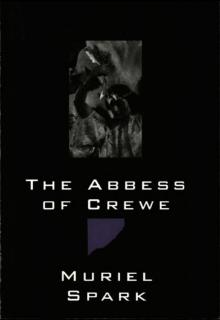 The Abbess of Crewe: A Modern Morality Tale
The Abbess of Crewe: A Modern Morality Tale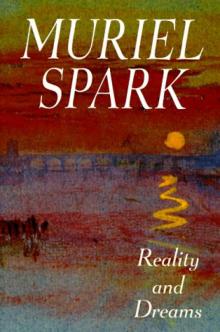 Reality and Dreams
Reality and Dreams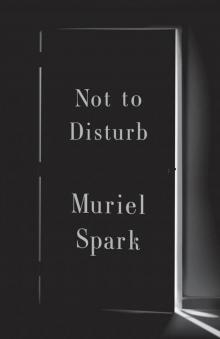 Not to Disturb
Not to Disturb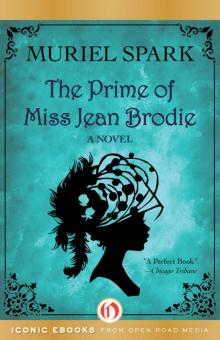 The Prime of Miss Jean Brodie
The Prime of Miss Jean Brodie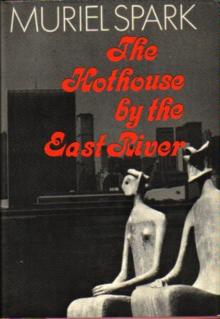 The Hothouse by the East River
The Hothouse by the East River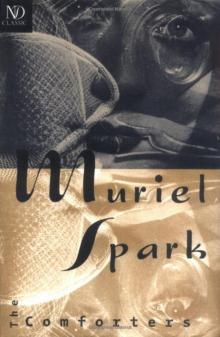 The Comforters
The Comforters (1958) Robinson
(1958) Robinson Unknown
Unknown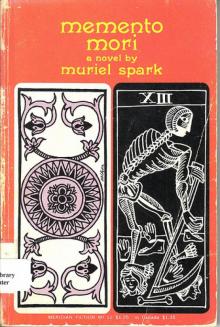 Memento Mori
Memento Mori The Finishing School
The Finishing School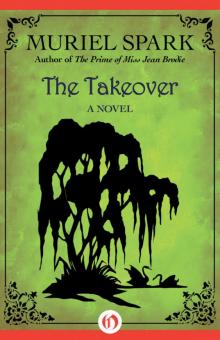 The Takeover
The Takeover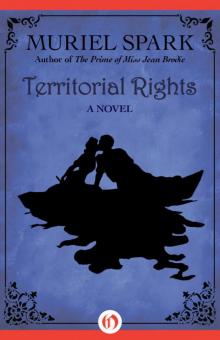 Territorial Rights
Territorial Rights The Complete Short Stories
The Complete Short Stories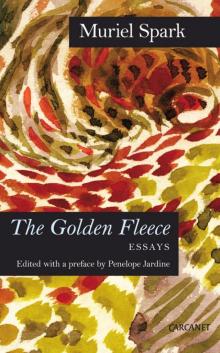 The Golden Fleece: Essays
The Golden Fleece: Essays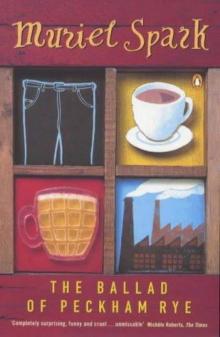 The Ballad of Peckham Rye
The Ballad of Peckham Rye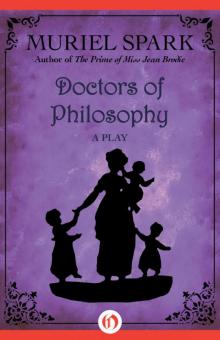 Doctors of Philosophy: A Play
Doctors of Philosophy: A Play The Mandelbaum Gate
The Mandelbaum Gate Loitering With Intent
Loitering With Intent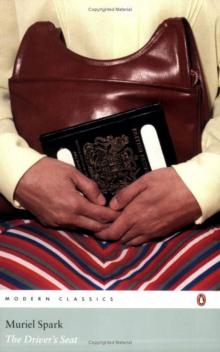 The Driver's Seat
The Driver's Seat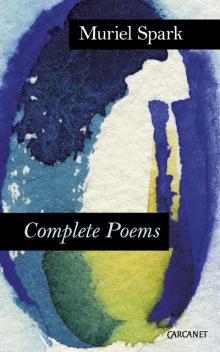 Complete Poems: Muriel Spark
Complete Poems: Muriel Spark Symposium
Symposium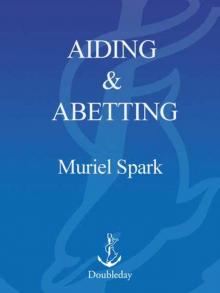 Aiding and Abetting
Aiding and Abetting The Golden Fleece
The Golden Fleece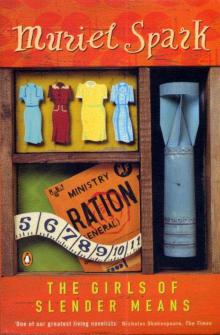 The Girls of Slender Means
The Girls of Slender Means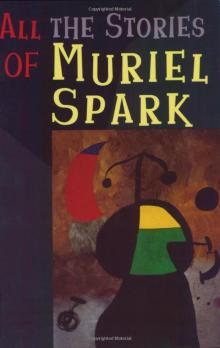 Alice Long’s Dachshunds
Alice Long’s Dachshunds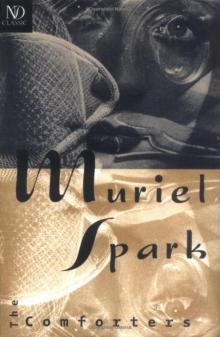 (1954) The Comforters
(1954) The Comforters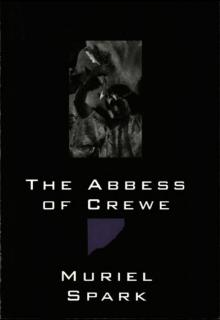 The Abbess of Crewe
The Abbess of Crewe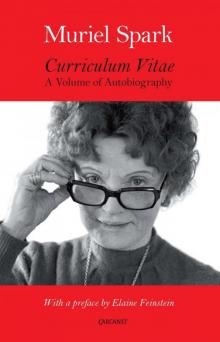 Curriculum Vitae
Curriculum Vitae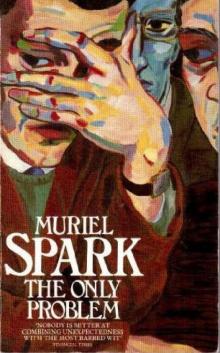 The Only Problem
The Only Problem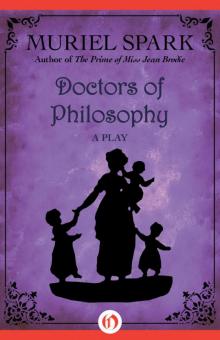 Doctors of Philosophy
Doctors of Philosophy